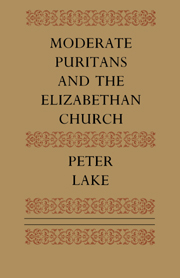Book contents
- Frontmatter
- Contents
- Dedication
- Preface
- 1 Introduction: Laurence Chaderton and the problem of puritanism
- 2 Moderate beginnings: the case of Edward Dering
- 3 Chaderton's puritanism
- 4 The moderate puritan divine as anti-papal polemicist
- 5 Thomas Cartwright: the search for the centre and the threat of separation
- 6 William Whitaker's position as refracted through his anti-papal polemic
- 7 Theory into practice: puritan practical divinity in the 1580s and 1590s
- 8 William Whitaker at St John's: the puritan scholar as administrator
- 9 The theological disputes of the 1590s
- 10 Conformity: Chaderton's response to the Hampton Court Conference
- 11 William Bradshaw: moderation in extremity
- 12 Conclusion
- Notes
- Bibliography
- Index
10 - Conformity: Chaderton's response to the Hampton Court Conference
Published online by Cambridge University Press: 16 October 2009
- Frontmatter
- Contents
- Dedication
- Preface
- 1 Introduction: Laurence Chaderton and the problem of puritanism
- 2 Moderate beginnings: the case of Edward Dering
- 3 Chaderton's puritanism
- 4 The moderate puritan divine as anti-papal polemicist
- 5 Thomas Cartwright: the search for the centre and the threat of separation
- 6 William Whitaker's position as refracted through his anti-papal polemic
- 7 Theory into practice: puritan practical divinity in the 1580s and 1590s
- 8 William Whitaker at St John's: the puritan scholar as administrator
- 9 The theological disputes of the 1590s
- 10 Conformity: Chaderton's response to the Hampton Court Conference
- 11 William Bradshaw: moderation in extremity
- 12 Conclusion
- Notes
- Bibliography
- Index
Summary
After the collapse of the classis movement in 1590 the puritan cause, taken in its most polemically developed form as a series of propositions concerning the liturgy and polity of the church, was faced with a crisis. For that cause was now deprived of its most coherent and polemically effective weapon – the presbyterian platform. If nothing else the debacle of 1589/90 had served finally to remove presbyterianism from any realistic agenda of incipient change or reform within the English church. But the accession of James I rekindled puritan hopes for further reformation. Those hopes came to centre on the conference at Hampton Court called by James to settle the religious position of his new realm once and for all.
Professor Collinson has demonstrated the considerable overlap of personnel and approach which linked puritan organisation and agitation prior to Hampton Court with the classis movement. However, not all the puritan aspirations centred on Hampton Court were presbyterian in form. In this chapter I want to examine the theoretical position adopted by Laurence Chaderton toward the issue of subscription, raised in its most acute form by the failure of the puritans to win a definitive victory at the conference and by Bancroft's subsequent drive for conformity. Chaderton's position here can be seen as a continuation of that developed by Cartwright and others in the late 1570s and 1580s.
- Type
- Chapter
- Information
- Moderate Puritans and the Elizabethan Church , pp. 243 - 261Publisher: Cambridge University PressPrint publication year: 1982
- 1
- Cited by



